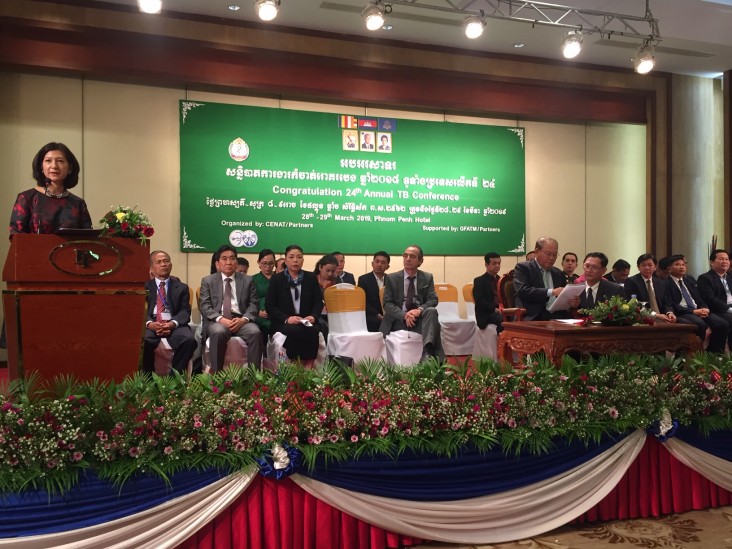Speeches Shim

(as prepared for delivery)
- Your Excellency, Dr. Mam Bunheng, Minister of Health
- Your Excellency, Dr. Mao Tan Eang, Director of CENAT and Advisor to the Ministry of Health
- Distinguished Guests, Ladies and Gentlemen
On behalf of USAID, it is a pleasure to be here with you today.
Globally, TB is the top infectious disease killer worldwide. Every year, over 10 million people are infected, and nearly 2 million lose their lives to this disease. Over 4 million cases are undiagnosed or without proper treatment and care – in fact, 40 percent of TB cases are undetected. This can lead to drug-resistant forms of the disease. Those strains are expensive to treat and subject patients to potential side effects. The high cost of medication and loss of income during a patient’s illness can lead to catastrophic expenditures and poverty.
Despite progress made in the last two decades, Cambodia still falls among the 30 high-burden TB countries in the world. Cambodia has narrowed the gap on undiagnosed TB cases significantly since 2000, but over a third of the estimated total cases are still “missing” and undetected. Ending TB by 2035 is not just about keeping pace with global targets, but also about alleviating the toll that TB takes on the most vulnerable people in society. I would like to take this opportunity to share with you a story about one such individual.
Srey is a 41-year-old farmer with three children who lives in Kampot. She had chronic cough and fever for months and she had sought care at a private clinic but she did not feel better. As her cough and fever continued, she decided to seek care at a health center where she was diagnosed and treated for TB. A year after completing her treatment, Mrs. Srey developed a severe cough with blood and was sent to a referral hospital for emergency care. Her sputum was collected for GeneXpert testing and she was diagnosed with MDR-TB. Mrs. Srey is now on treatment for MDR TB and on her way to recovery.
Mrs. Srey’s story raises many questions for us, as health policy makers, donors, and health service providers. Without access to GeneXpert testing, Mrs. Srey may have continued to receive inadequate treatment and the drug resistant bacteria could have spread to her children and others who live near her. So how can we ensure that Cambodians have access to the right technology, and that all healthcare providers recognize the signs of TB and refer patients accordingly?
Like Mrs. Srey, we know that 64 percent of patients first seek care at private clinics. This means Cambodia has one of the highest out-of-pocket expenditure rates in the region. How can we work with private providers to ensure that patients who may have TB are referred to public facilities for treatment? Beyond that - how can we ensure that social health protection schemes cover TB treatment and services especially for vulnerable populations?
Answering these questions requires a lot of thought, planning, commitment, coordination, collaboration, and – most importantly – leadership at all levels. USAID is proud to continue its commitment to helping the Ministry of Health, the National TB Program and its partners to answer these tough questions.
In September 2018, USAID Administrator, Mark Green announced USAID’s new TB business model, called the “Global Accelerator to End Tuberculosis.” This initiative will help our partner countries to meet the ambitious targets set at the United Nations General Assembly of treating 40 million people by 2022. This change in approach increases USAID’s emphasis on leveraging investments from countries, public and private sectors, and local organizations to end the TB epidemic, while simultaneously building local self-reliance and responsibility.
I want to close my remarks by congratulating the Royal Government of Cambodia on the progress made so far in the fight against TB. USAID is proud to be a part of that effort in Cambodia, and we stand ready to work together with the Royal Government to help End TB by 2035.
Thank you again for inviting me to speak today. I wish you fruitful discussion over the next two days.
Soam awkun!
Related Speeches
- Remarks by Menglim Kim, Project Management Specialist, USAID/Cambodia, USAID Greening Prey Lang Final Youth Debate
- Remarks by Ms. Hanh Nguyen, Deputy Mission Director USAID/Cambodia, Health Professional Councils’ Strategic Planning Orientation Workshop
- Remarks by John Eyres, Director, Office of Public Health and Education, USAID/Cambodia, Dissemination Workshop of the Fifth National Strategic Plan for a Comprehensive & Multi-sectoral Response to HIV & AIDS in Cambodia

Comment
Make a general inquiry or suggest an improvement.